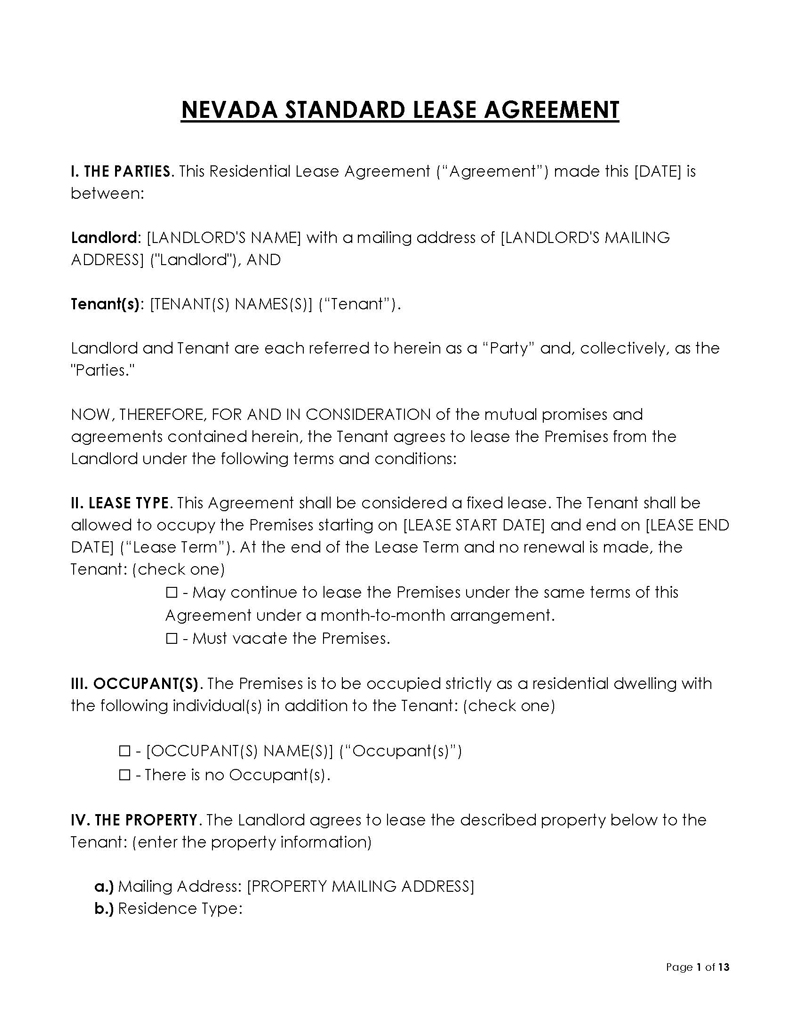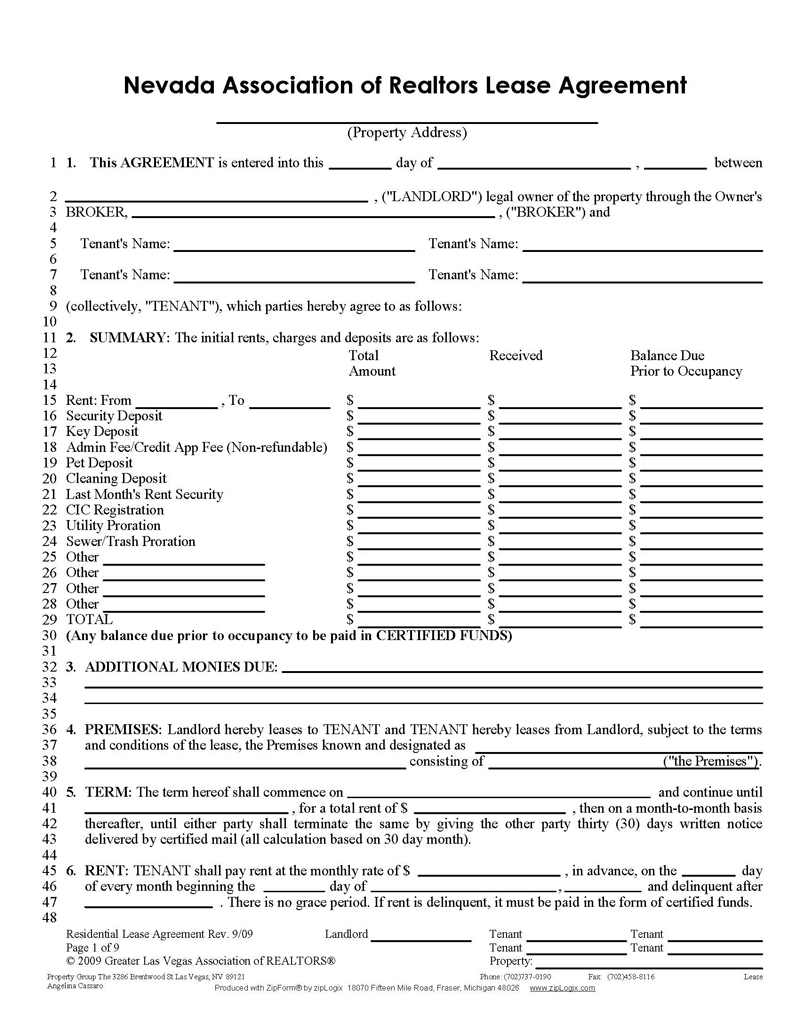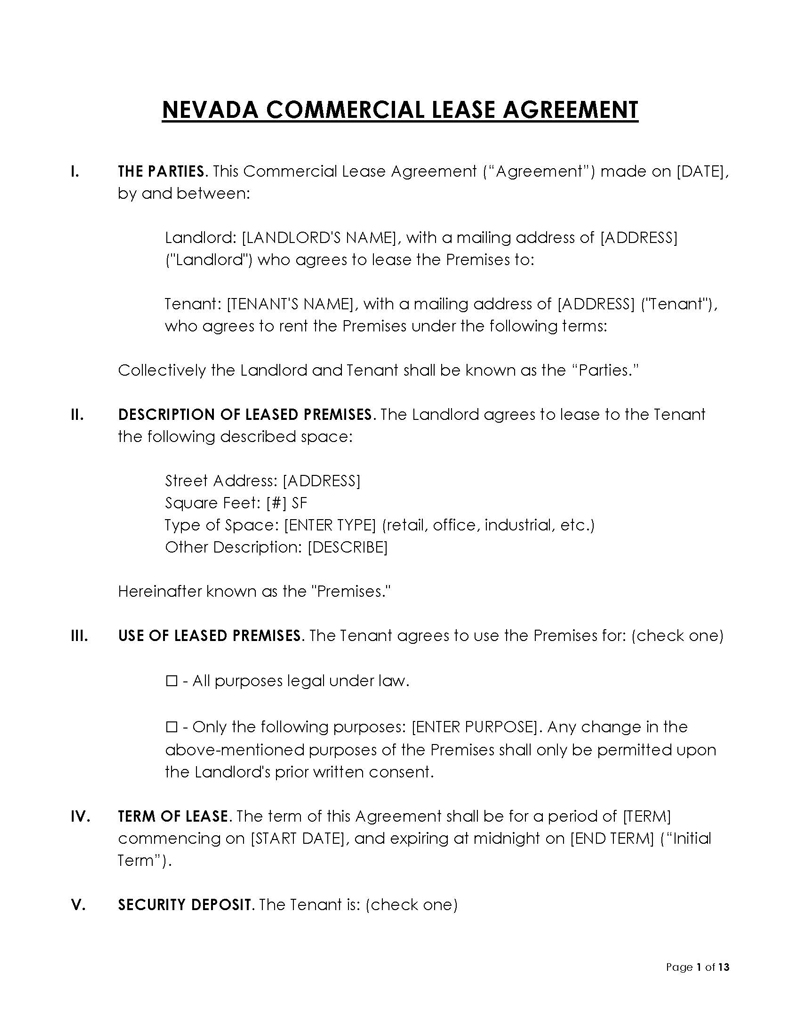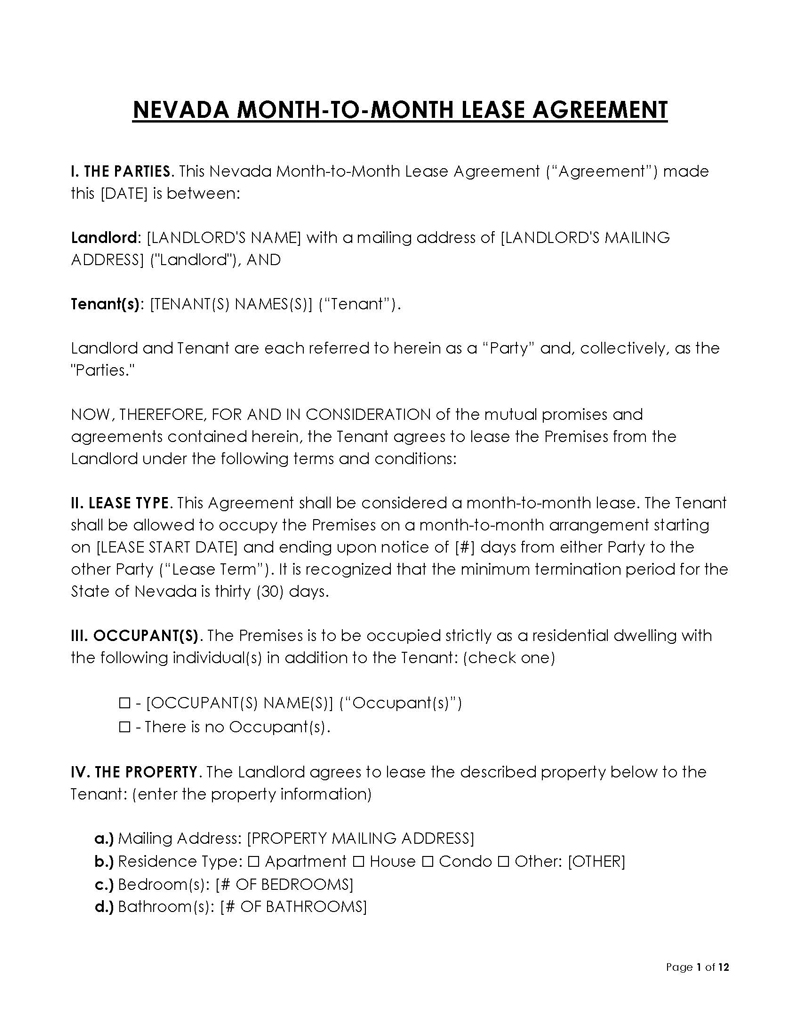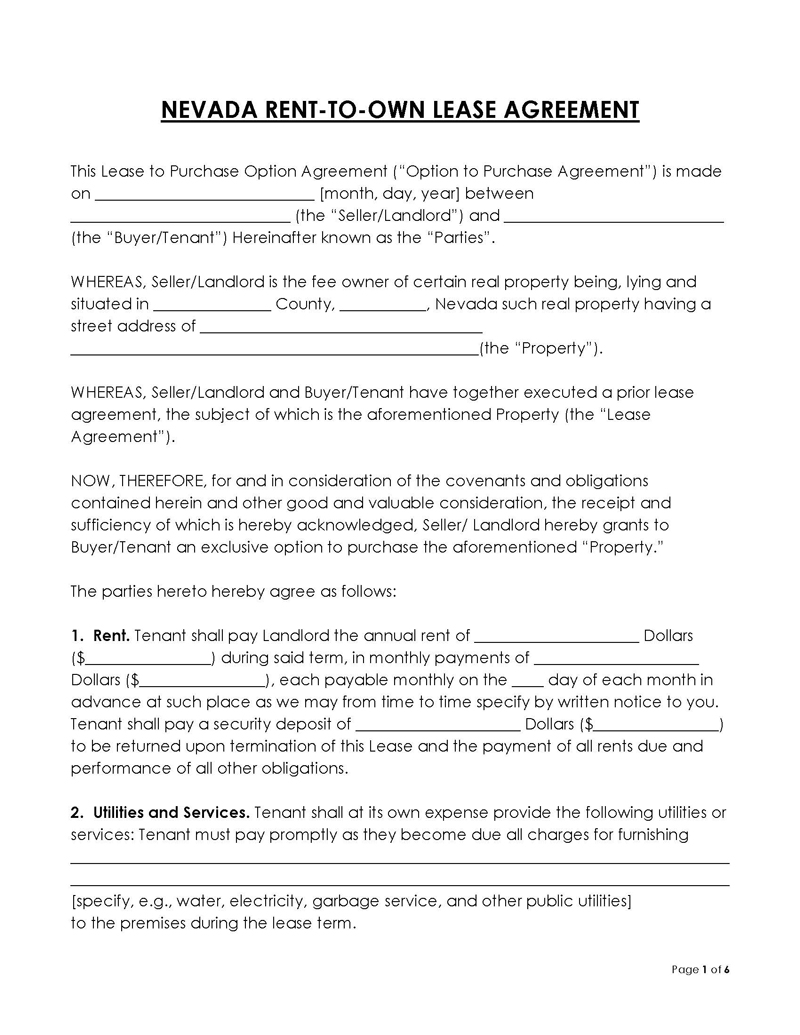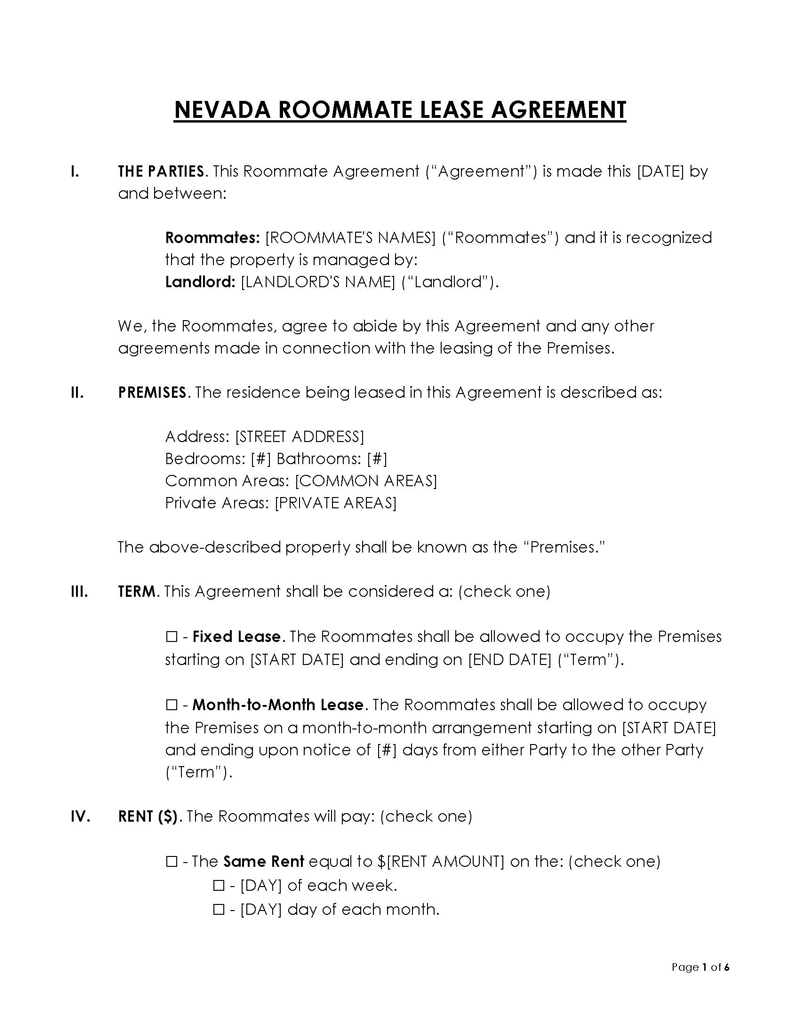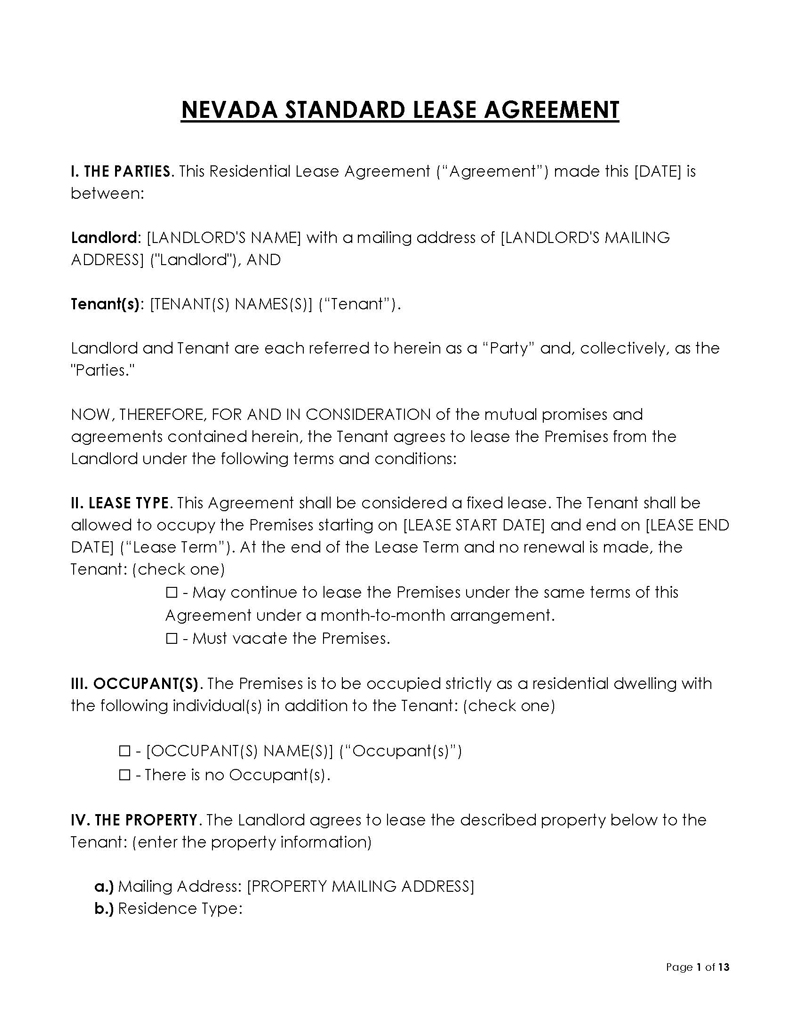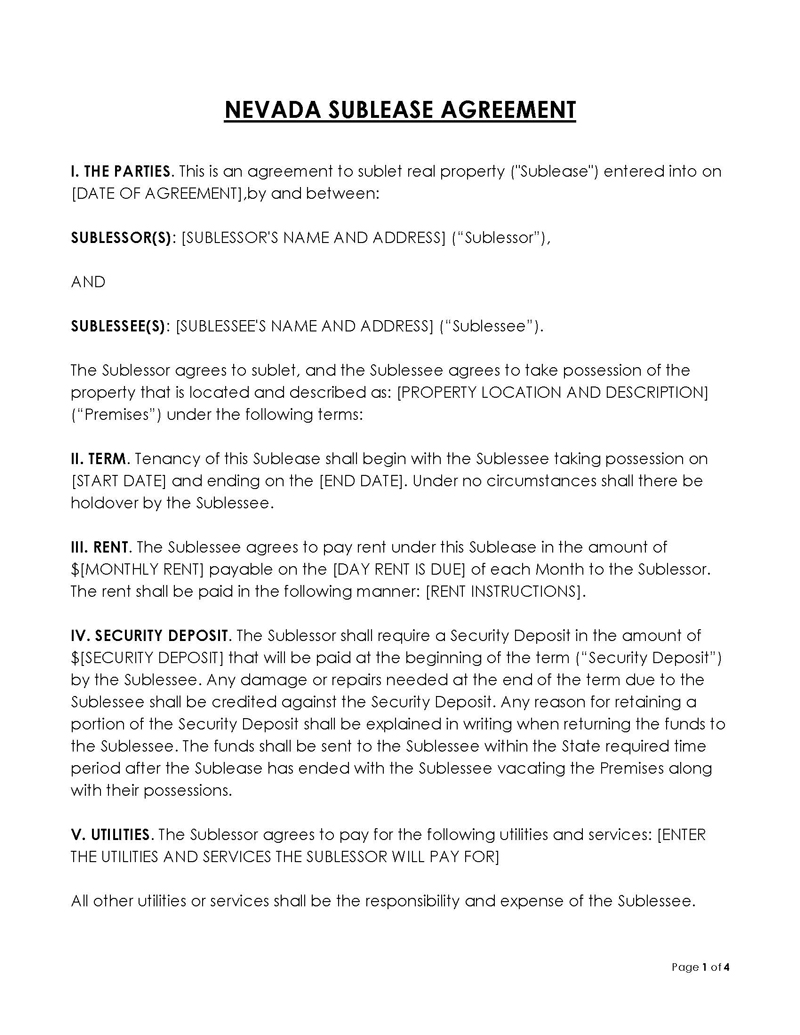A Nevada lease agreement is a contract used by landlords and tenants to establish the rules and regulations of a rental property in Nevada.
It should comply with Nevada state laws and must be in writing. By signing the agreement in Nevada, both parties [landlord and tenant] agree to uphold their obligations under the contract.
The purpose of the agreement is to protect both the landlord and the tenant by clearly specifying the rights and obligations of each party while also setting expectations for the duration of a tenancy. It will describe details such as the duration of a tenancy, rent amount and when it is due, the type of property up for lease — commercial or residential, and the landlord’s and tenant’s responsibilities regarding maintenance and repairs. It may also contain further clauses such as pet ownership, smoking, or subletting. Having a well-written agreement in place can help avoid misunderstandings or disputes in future.
A standard lease agreement is renewable after one year, but unique options are available for monthly renewal or at-will renewal. Landlords in Nevada usually carry out background checks on rental applicants before trusting that the tenant can afford the rent. It provides peace of mind for tenants, knowing that their occupancy is secure for a set period. In contrast, for landlords, the agreement protects their property investment by ensuring that they receive regular rental payments and that their property is well-maintained.
What You Need to Know About Lease Agreement Laws in Nevada
There are certain laws concerning the agreements in Nevada. Both landlord and tenant should be aware of these laws to avoid any misunderstandings in the future:
Landlord’s access
In the state of Nevada, landlords are allowed to access their rental units for specific reasons and with proper notice. These reasons may include making repairs, conducting inspections, or showing the unit to prospective tenants. This notice can be delivered in person, by mail, or left at the tenant’s front door. However, there are some exceptions to this rule.
EXAMPLE
If there is an emergency, such as a fire or a flood, the landlord may enter the unit without giving notice. This law technically protects the tenant’s rights.
Laws in place for landlord’s access to their tenant’s apartment are detailed below:
- General access: The general access law (NRS 118A.330(3)) states that a landlord shall give their tenant at least 24 hours notice before accessing the tenant’s rented unit.
- Emergency access: The emergency access law (NRS 118A.330(2)) states that a landlord shall not need to request permission to enter the tenant’s rented unit in the event of an emergency.
- Security deposits: One of the most important aspects of any lease agreement is the security deposit. The security deposit is designed to protect the landlord in case of damages to the property or if a tenant fails to pay rent. Understanding these laws is essential for both landlords and tenants in Nevada.
Maximum amount ($)
(Nevada Statutes Law; NRS 118A.242(1)) dictates the maximum amount that a landlord is entitled to seek, i.e., up to three (3) rent in advance from the tenant before the tenant is allowed to take control of the property
Returning to the tenant ($)
The tenant is entitled to receive an itemized list of damages and charges before the landlord may keep any of the security deposit. The landlord has 30 days after the termination of occupancy to do this — authorized by (NRS 118A.242(4)).
Rent increase notice
Nevada law requires that landlords give their tenants at least forty-five (45) days’ notice before increasing the rent. This notice for rent increment for at-will tenancies of less than a month is fifteen days (15) as authorized by (NRS 118A.300).
Commercial Law
Nevada’s commercial law (Chapter 118C) governs the agreements for commercial properties. Under state law, a commercial lease agreement must be in writing and signed by the landlord and tenant. The lease must contain certain information, such as the names of the parties, the address of the property, the amount of rent, and the length of the lease. Additionally, the lease must state whether the tenant is responsible for paying property taxes and insurance.
In Nevada, commercial leases are subject to the “implied covenant of quiet enjoyment.” This means that the landlord has to provide the tenant with a premise that is fit for its intended use. If the landlord violates this covenant, the tenant may have grounds for terminating the lease.
Residential Law — (Landlord and Tenant: Dwellings)
Nevada’s residential lease agreement law is found in (Chapter 118A) of the Nevada Revised Statutes. These laws pertain to the relationship between landlord and tenant and set forth the rights and obligations of both parties. The laws cover the landlord’s duty to maintain the property in a habitable condition, the tenant’s right to quiet enjoyment of the premises, and the procedures for terminating a lease. In addition, the law establishes specific protections for victims of domestic violence, sexual assault, or stalking.
Required Lease Disclosures
When entering into a lease agreement in Nevada, certain required disclosures must be made by the landlord. These disclosures are designed to provide the tenant with important information about the property, the terms of the lease, their rights, and their responsibilities.
The following are the disclosures and addendums required for the agreement in Nevada:
Fees
Landlords are legally required to disclose all fees associated with renting their property as authorized by (Nevada Statutes Law; NRS 118A.200). Potential tenants need to be aware of any hidden fees that may be included in their agreement before signing it. This disclosure must include details such as application fees, pet deposits, or late payment fees.
Foreclosure disclosure
If the property has foreclosure proceedings, this disclosure must state the status of the foreclosure proceedings and provide information on the rights of the tenant.
EXAMPLE
The tenant must be notified if they may be required to move out of the property if/when it is sold at auction. The landlord is also required to give the tenant a copy of any notice that has been filed with the court.
By understanding these disclosure requirements, tenants can be sure that they are fully informed of their rights before signing the agreement as authorized by (NRS 118A.275).
Lead-based paint disclosure
As a landlord in Nevada, you must provide certain disclosures to your tenants. One of these is a lead-based paint disclosure. If your property was built before 1978, it might contain lead-based paint. Lead exposure can cause serious health problems, and therefore, tenants should be aware of the risk.
To make this disclosure, you must provide the tenant with a Lead-Based Paint Disclosure form. Both the landlord and the tenant must sign this form. It should include information about the presence of lead-based paint on the property and any repairs or renovations that have been made to address the issue.
The landlord must also provide the tenant with a pamphlet from the EPA that contains further information on lead-based paint and lead poisoning. By ensuring that all required disclosures are included in the agreement, landlords can help protect themselves from potential liability.
Move-in checklist
The disclosure applies to all rental units as authorized by (NRS 118A.200(k)). The move-in checklist must cover the general condition of the rental unit and common areas. A move-in checklist is an important tool for protecting both the landlord and tenant’s rights and interests, and it helps to ensure that any damage to the rental unit is documented from the start. By understanding and following these disclosure requirements, landlords can help to avoid potential legal problems that may arise in the future.
Nuisance/violation notice
As a landlord in Nevada, you must provide nuisance/violation disclosures to your tenants in their agreement (NRS 118A.200). This notice informs tenants that they are responsible for complying with all local laws and ordinances and that they may be subject to eviction if they engage in any illegal or disruptive behavior. The purpose of this disclosure is to help prevent problems from occurring in the first place, and it can be an important tool in maintaining the peace and order of your rental property.
Right to raise the USA flag
This disclosure concerns the landlord’s policy on the tenant’s right to raise the United States flag (NRS 118A.325). As a landlord, you must include a statement in the agreement you are drafting, informing the tenant of their right to raise the flag in Nevada and any restrictions on flag size, location, or the number of flags that may be raised.
Landlord/emergency contact
This disclosure applies to all rental units in Nevada. According to this agreement statutes — (NV Rev Stat § 118A.260 (2019), this disclosure includes the name and address of the landlord or their designated agent and an emergency contact’s name and contact information.
This emergency contact should be someone who can be reached in the event of an emergency at the rental property, such as a fire or flood. It also helps protect landlords from liability if something should happen on the property.
Late fees disclosure
This disclosure applies to any unit charging late fees. It must state the amount of the late fee and the circumstances under which it will be charged. However, late fees under the agreement must not exceed 5% of the due balance and shall be charged on the monthly due rent only (NV Rev Stat § 118A.210 (2019)). It is non-inclusive of the already accrued late fees.
The purpose of this disclosure is to ensure that tenants are aware of any late fees that may be charged so that they can budget accordingly. Late fees can be a significant expense, so tenants should be aware of them before signing the agreement.
Optional disclosures and addendums
Optional disclosures and addendums are disclosures that are not mandatory under Nevada’s lease agreement law, but they are advised to ensure further understanding of the state of the property. This may prevent future conflicts and legal liability for landlords.
These disclosures shall cover any known defects in the property that could affect the health or safety of the tenants. This includes disclosing any information about bedbugs, asbestos, mold, water damage, or noise levels. The tenant may also have several disclosure requirements, such as revealing whether they have any pets or an addendum about subletting the property. By including these optional disclosures and addendums, both parties can help ensure that their rights and responsibilities are clearly defined.
Commonly Used Lease Agreements in Nevada
All of the commonly used Nevada rental agreements are legally binding and share similar elements. Although, they have a few distinct differences.
These commonly used agreements in Nevada are:
Association of realtors
This type of agreement is used when a realtor facilitates a rental property. It is guided by the Greater Las Vegas Association, which requires that the realtor can use this document to validate a tenancy agreement once a tenant has been shown the property and their income has been verified. In addition, the realtor is entitled to a commission to be paid by the party they represent — the landlord.
Commercial lease agreement
Commercial lease agreement is used for the tenancy agreement involving commercial properties (Nevada Revised Statutes: Chapter 118C). The terms and conditions of the lease may include lease duration, rent amount, renewal condition, commercial activity (retail, industrial, or office space), and subleasing. Because a commercial agreement can be legally binding for as much as five (5) to ten (10) years, it is advised that a legal professional review the contract before it is signed.
Month-to-month lease agreement
A month-to-month lease agreement is a tenancy contract used by landlords in Nevada to lease their residential property to tenants on a monthly basis (Nevada Revised Statutes § 40.251(1)(a)(2)) — with a notice for termination is thirty (30) days. It includes property expenses, renewal rent payment, security deposit, and other rental obligations. However, this tenancy contract does not specify an end date like the case of a standard lease contract. Instead, the tenancy continues indefinitely until the tenant or landlord decides to end the contract.
Rent-to-own lease agreement
A rent-to-own lease agreement is a tenancy agreement that combines a residential lease contract with a purchase and sale contract, which makes the parties involved landlord/seller and a tenant/buyer. The agreement entails option fee, rent amount, purchase price, the length of the lease, and other considerations. This rental arrangement allows the tenant to buy the property after the lease expires.
Roommate lease agreement
It is a contract that enforces responsibilities and obligations as tenants between individuals living in a shared residence. This agreement is legally binding between the occupants who live in the apartment only. It is independent of the agreement that is originally established between the landlord and the tenant. This agreement entails visitor restrictions, cleaning schedule, smoking restrictions, premises maintenance, and rent payment division.
Standard lease agreement
This is the agreement that can generally be used for the tenancy agreement involving residential properties in Nevada (Nevada Revised Statutes: Chapter 118A). This agreement covers all the provisions, obligations, and responsibilities that are necessary to uphold a mutual rental arrangement between a landlord and tenant. The agreement entails standard terms such as rights and obligations of both parties, length of the lease, payment date, rent amount, tenancy end date, security deposits, termination options, utilities, and services.
Sublease agreement
This agreement is between a sublessee (a subtenant) and sublessor (the master tenant whose name is on the original agreement). A tenant may choose to sublet their residential property for reasons such as constant traveling, which leaves the home unused for a couple of months. The sublessor gets paid by the sublessee for using the property while being away, and the sublessor eventually transfers the fees to the landlord.
According to the (Nevada Revised Statutes: NRS 118B.040(2)(h)), sublessors are accountable and liable for any property damage by the sublessee that violates the agreement between the landlord and the sublessors (master tenant). The sublessee and sublessor can be evicted from the property by the landlord with three (3) days notice if the sublease agreement violates the original agreement.
Drafting these agreements from scratch requires a lot of attention to detail and compliance with Nevada state laws. Following pre-made templates will save you your good time and effort, and guarantee that you are not leaving out any important detail. These customized agreement templates are free to download, easy to use, and can be used multiple times.
Frequently Asked Questions
In Nevada, the maximum length of a residential lease is one year. This does not mean that landlords cannot require tenants to sign a lease for more than 12 months — a writing declaration is mandatory in such cases. However, shorter leases are also common in the state. Many landlords offer leases that are six months or even month-to-month. This flexibility can be beneficial for tenants who are unsure of their long-term plans. It can also be helpful for landlords, as it allows them to fill vacancies more easily.
Yes. In the state of Nevada, a contract to lease is binding if it meets the following three criteria: it must be in writing, it must be signed by the parties (landlord and tenant) involved, and it must include an offer and acceptance. If these three elements are present, then the contract is legally binding, and both parties (landlord and tenant) are required to uphold their obligations under the agreement.
Yes. Lease agreements in Nevada must be notarized especially if an agent represents the landlord and signs the agreement on their behalf (NV Rev Stat § 118A.200 (4) (2019).
A standard lease agreement is considered to be legally binding. As long as both the landlord and the tenant sign and agree to the lease terms, it does not need to be notarized to be enforceable.
Yes. In the state of Nevada, a lease can automatically renew if certain conditions are met. The landlord and tenant must have signed a written agreement that includes a clause specifying that the lease will renew automatically.
Without an initial automatic renewal clause, if the two parties make no attempt to send a notice concerning the renewal of rent, the lease automatically renews (NV Rev Stat § 118A.470 (2019)).
However, it is important to note that either the landlord or tenant can give written notice at any time during the lease stating their intention to terminate the lease at the end of its current term. As a result, the landlord or tenant must give at least 30 days’ notice to terminate a month-to-month lease agreement and seven days notice to terminate a weekly lease agreement (NV Rev Stat § 40.251 (2019)).
